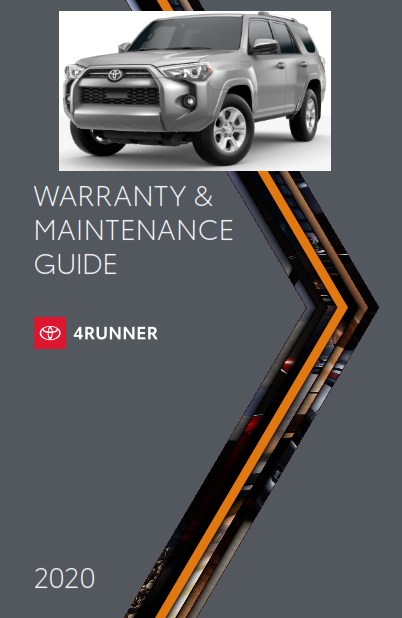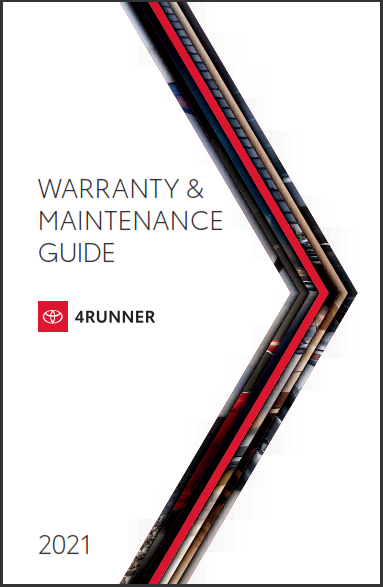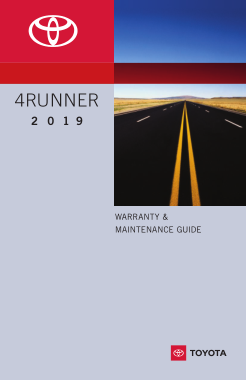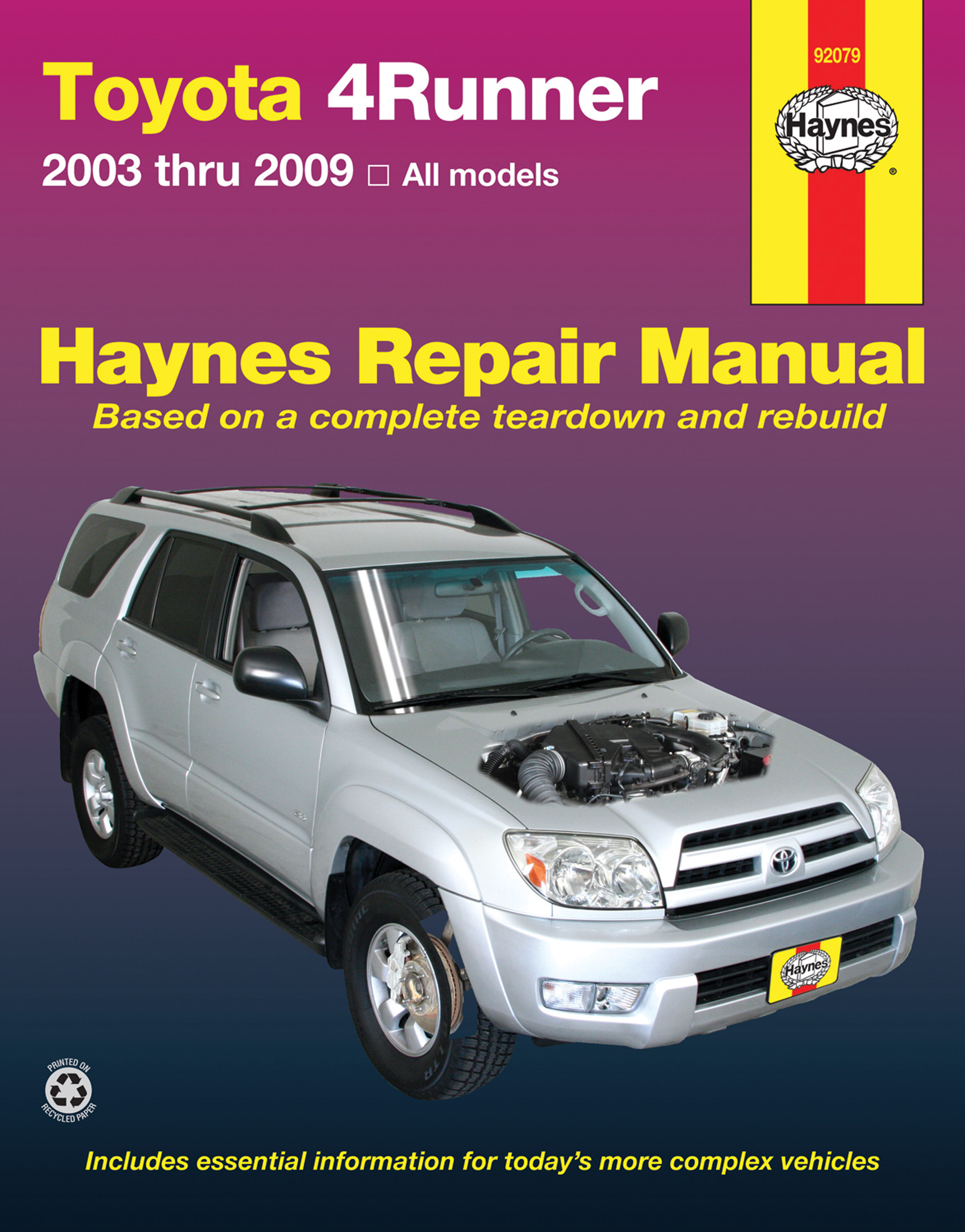Maintaining The Legacy: A Comprehensive Guide To Toyota 4Runner Maintenance
Maintaining the Legacy: A Comprehensive Guide to Toyota 4Runner Maintenance
Related Articles: Maintaining the Legacy: A Comprehensive Guide to Toyota 4Runner Maintenance
Introduction
With great pleasure, we will explore the intriguing topic related to Maintaining the Legacy: A Comprehensive Guide to Toyota 4Runner Maintenance. Let’s weave interesting information and offer fresh perspectives to the readers.
Table of Content
Maintaining the Legacy: A Comprehensive Guide to Toyota 4Runner Maintenance

The Toyota 4Runner, renowned for its rugged durability and off-road prowess, is a vehicle built to last. However, like any machine, it requires consistent care and attention to maintain its peak performance and longevity. Adhering to a regular maintenance schedule is crucial for ensuring the 4Runner’s reliability, safety, and overall value. This comprehensive guide delves into the intricacies of Toyota 4Runner maintenance, providing a roadmap for owners to keep their beloved vehicles in optimal condition.
Understanding the Importance of Regular Maintenance
The benefits of adhering to a consistent maintenance schedule for a Toyota 4Runner are multifaceted:
- Enhanced Performance: Regular servicing ensures all components operate efficiently, maximizing power, fuel economy, and overall driving experience.
- Prolonged Lifespan: Timely maintenance prevents wear and tear, extending the vehicle’s lifespan and reducing the risk of costly repairs.
- Increased Safety: Maintaining crucial systems like brakes, steering, and suspension enhances safety on the road, mitigating potential hazards.
- Resale Value: A well-maintained 4Runner commands a higher resale value, reflecting its superior condition and reliability.
- Peace of Mind: Knowing your vehicle is regularly serviced provides peace of mind and confidence in its performance and safety.
The Toyota 4Runner Maintenance Schedule: A Breakdown
Toyota provides a detailed maintenance schedule for its vehicles, outlining specific services and intervals. The frequency of these services can vary based on driving conditions, mileage, and the model year of the 4Runner. However, the core elements of the schedule remain consistent:
1. Oil Changes:
- Frequency: Every 5,000 to 7,500 miles or six months, whichever comes first.
- Importance: Engine oil lubricates moving parts, reducing friction and wear. Regular oil changes ensure optimal engine performance and prevent premature damage.
2. Air Filter Replacement:
- Frequency: Every 12,000 to 15,000 miles or annually.
- Importance: The air filter prevents dust and debris from entering the engine, ensuring efficient combustion and protecting the engine from damage.
3. Spark Plug Replacement:
- Frequency: Every 30,000 to 100,000 miles, depending on the spark plug type and engine.
- Importance: Spark plugs ignite the air-fuel mixture, ensuring proper engine combustion. Worn spark plugs can lead to decreased performance, fuel efficiency, and emissions issues.
4. Brake Fluid Flush:
- Frequency: Every two years or 30,000 miles.
- Importance: Brake fluid absorbs moisture over time, affecting its ability to transfer pressure effectively. Flushing the system ensures optimal braking performance and safety.
5. Transmission Fluid Change:
- Frequency: Every 30,000 to 60,000 miles or as recommended by Toyota.
- Importance: Transmission fluid lubricates and cools the transmission, ensuring smooth shifting and preventing premature wear.
6. Coolant Flush:
- Frequency: Every 30,000 to 60,000 miles or as recommended by Toyota.
- Importance: Coolant prevents engine overheating by transferring heat away from the engine. Regular flushing ensures optimal cooling efficiency and prevents engine damage.
7. Tire Rotation and Inspection:
- Frequency: Every 5,000 to 7,500 miles or as needed.
- Importance: Tire rotation distributes wear evenly across all tires, prolonging their lifespan. Regular inspection ensures tire pressure and tread depth are within safe limits.
8. Belt and Hose Inspection:
- Frequency: Every 30,000 to 60,000 miles or as needed.
- Importance: Belts and hoses are essential components in the engine’s cooling and accessory systems. Inspecting for wear and tear ensures they function properly and prevent potential failures.
9. Suspension and Steering Inspection:
- Frequency: Every 15,000 to 30,000 miles or as needed.
- Importance: Regular inspection ensures the suspension and steering components are in good working order, maintaining safe handling and ride quality.
10. Battery Inspection and Replacement:
- Frequency: Every 36 months or as needed.
- Importance: The battery provides power to the vehicle’s electrical system. Regular inspection and replacement ensure reliable starting and proper electrical function.
Beyond the Schedule: Addressing Specific Concerns
While the Toyota 4Runner maintenance schedule provides a solid foundation, certain factors can influence the need for additional services. These include:
- Driving Conditions: Off-road driving, frequent towing, or extreme weather conditions can accelerate wear and tear, requiring more frequent maintenance.
- Driving Habits: Aggressive driving styles can put additional stress on components, necessitating more frequent checks and replacements.
- Vehicle Age: Older vehicles may require more frequent maintenance due to accumulated wear and tear.
Toyota 4Runner Maintenance Schedule: FAQs
Q: How often should I change the air filter in my Toyota 4Runner?
A: The air filter should be replaced every 12,000 to 15,000 miles or annually, whichever comes first.
Q: Can I change the oil myself?
A: While changing the oil yourself is possible, it’s recommended to consult the owner’s manual for specific instructions and safety precautions.
Q: What are the signs of a worn spark plug?
A: Signs of worn spark plugs include decreased engine performance, rough idling, misfires, and increased fuel consumption.
Q: How do I know when to replace my brake pads?
A: You can visually inspect the brake pads for wear and tear. A qualified mechanic can also measure the thickness of the pads during a routine inspection.
Q: Is it necessary to flush the transmission fluid?
A: Yes, it’s recommended to flush the transmission fluid every 30,000 to 60,000 miles or as recommended by Toyota.
Q: How often should I check my tire pressure?
A: It’s recommended to check your tire pressure at least once a month, and before long trips.
Q: What are the signs of a bad battery?
A: Signs of a bad battery include slow cranking, dimming headlights, and difficulty starting the vehicle.
Toyota 4Runner Maintenance Schedule: Tips for Optimal Care
- Consult the Owner’s Manual: The owner’s manual provides detailed information on recommended maintenance intervals, procedures, and specifications.
- Keep Up with Scheduled Services: Adhering to the recommended maintenance schedule is crucial for preventing costly repairs and maintaining optimal performance.
- Use Quality Parts: Use genuine Toyota parts or high-quality aftermarket parts to ensure optimal performance and longevity.
- Choose a Reputable Mechanic: Select a qualified and experienced mechanic to perform your maintenance services.
- Maintain Records: Keep accurate records of all maintenance performed, including dates, services, and parts used.
- Be Proactive: Address any unusual noises, vibrations, or warning lights promptly. Early detection can prevent major problems.
Conclusion
Maintaining a Toyota 4Runner is an investment in its longevity, reliability, and value. By adhering to the recommended maintenance schedule, using quality parts, and seeking professional assistance when needed, owners can ensure their 4Runner remains a trusted companion for years to come. A well-maintained 4Runner is a testament to its enduring legacy, ready to conquer any terrain and deliver years of adventure and satisfaction.








Closure
Thus, we hope this article has provided valuable insights into Maintaining the Legacy: A Comprehensive Guide to Toyota 4Runner Maintenance. We appreciate your attention to our article. See you in our next article!
You may also like
Recent Posts
- The 2025 Toyota 4Runner: A Legacy Reimagined
- The Enduring Appeal Of The Toyota 4Runner Manual Transmission 4×4
- The Toyota 4Runner TRD Off-Road: A Legacy Of Adventure, Reimagined For 2025
- The Anticipation Builds: Unveiling The Next Generation Toyota 4Runner
- The 2025 Toyota 4Runner TRD: A Legacy Of Adventure Reimagined
- The Future Of Color: Exploring The Significance Of Color Trends
- The Toyota 4Runner: A Legacy Of Capability, Now With Expanded Seating
- The Toyota 4Runner Timing Belt: A Vital Component For Engine Longevity
Leave a Reply